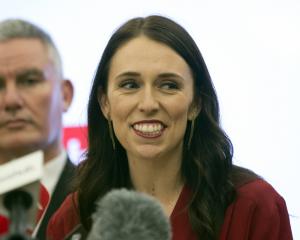Three months out from the election, the numbers are going National's way. But are they going the right way for the longer term?
How numbers are used is critical to good government, new research says.
The big number economy story is that gross domestic product (GDP) was still rolling along up to March, and in this quarter, too, indicators say, even if not rollicking at last year's pace.
That roll plus an election year budget in May from campaign manager Steven Joyce have lifted National's poll average through to mid-June to nearly 47%, its 2014 election score.
Right-track-wrong-track measures are also still strongly positive, a good sign for an incumbent government.
So Bill English and president Peter Goodfellow will have to work at National's pre-election conference this weekend to contain euphoria and inject an edge of ``paranoia'', as Mr English puts it. Mr English, remember, took National in 2002 to a 100-year low of 21% for a major party.
Money, membership and momentum are all strong. National is more together than in 1969 when (to its surprise) it last won a fourth term.
But what sort of conditions will Mr English and Mr Joyce face if they get a fourth term (leaving aside working out a working relationship with Winston Peters)?
The OECD report last week had a few worrying pointers. One was ridiculous house prices coupled with dangerously high household debt. Others were below-OECD-average productive investment, research and development investment and tertiary education attainment, which lead to low-level jobs and, a big OECD worry, to low labour productivity.
Next, take the immigration flood out of the GDP figure and you see why Mr English said Labour's plan to take out more of the lowest value immigration than he already has would ``stall'' the economy. In the two quarters to March, immigration accounted for all of the GDP growth. Per capita GDP fell 0.2% and 0.1%.
So economic numbers could go wrong in a fourth term - as some did in National's failing 1969-72 fourth term.
Some other numbers could also go wrong.
Doing business with the government online is increasingly practicable. New Zealand is a global leader, both in actual access and continuing momentum of development, according to analysts at Tufts University.
The reverse of this is that government agencies collect masses more data on us than even five years ago.
They can then use computer ``machine learning'' to analyse the data to pinpoint who to help to get the highest return on ``investment'' of funds and services.
This is known as ``citizen-based analytics''. Chief science adviser Sir Peter Gluckman has just issued a discussion paper on the use of these data.
Mr English has, for some years, been pushing greater use of these richer data to channel funds through what he calls ``social investment''.
He has often said that ``we know who they are'', meaning the children who most need, and would most benefit from, government intervention - to the benefit of all of us if he gets the intervention right. Oranga Tamariki aimed at the ``most vulnerable'' 5% of children is a product of this thinking.
Supplementing citizen-based analytics are ``life-course'' data from Richie Poulton's world-renowned 45-year Dunedin study of a cohort born in 1972 which give a good idea of what early childhood deficiencies need to be addressed to enable disadvantaged children to develop fully, cope better later in life and live fuller, positive and productive lives.
That would benefit us all far more than imprisoning those who fail.
Sir Peter's paper focuses on applying ``scientific understandings'' to the data agencies collect ``to avoid a large number of potential interpretative errors''.
That requires rigorous scientific testing to avoid confusing correlation with causation. He also says using data does not do away with improving traditional policy analysis.
The paper says there must be ``appropriate data governance and safeguards, accountability and oversight''. Data collected on individuals need to be anonymised, as Statistics New Zealand does.
In collecting and using personal data, Sir Peter says, the government needs ``social licence'' - understanding and approval from the public - which the Ministry for Social Development (MSD) did not get before trying to force a wide range of charities to divulge information on those they were helping.
MSD's humiliating backdown on that plus its and other government data security failures suggest agencies are far short of meeting Sir Peter's standards for ``curation'' of the data.
That suggests there is a big accident waiting to happen, which would not be helpful to Mr English in a fourth term.
Nor would an accident to the economy of the sort the imbalances identified by the OECD would trigger. Such an accident could make a National fourth term post-2017 as grim as its 1969-72 one.
Meantime, since an accident of either sort is unlikely before September 23, there is a stronger case for euphoria than paranoia at National's launching pad this weekend.
Colin James is a social and political commentator. ColinJames@synapsis.co.nz












